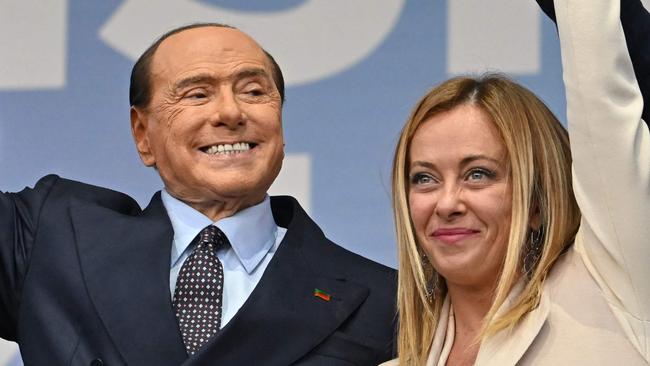Giorgia Meloni’s no Duce, more Silvio Berlusconi

But what of Giorgia Meloni and Brothers of Italy, a party that won only 4 per cent of the vote in the previous election in 2018 but this time has achieved 26 per cent – enough to make its leader Italy’s first female prime minister?
There is a sensational answer, of course: fascism.
Meloni grew up as a neo-fascist, an adolescent activist in the Movimento Sociale Italiano (Italian Social Movement). Those in the know said fans understood that MSI really stood for Mussolini Sempre Immortale (Mussolini is immortal forever, a tautology the Duce, an able journalist, might have disdained).
The name also invoked the Repubblica Sociale Italiana, created for those Italians who opposed King Victor Emmanuel III’s sacking of Benito Mussolini on July 25, 1943, and approved retaining his dictatorship’s alliance with Nazi Germany.
The MSI was founded in December 1946. Throughout the decades of complex politicking in the Italian Republic to 1990, it remained in opposition, seemingly committed to a radical devotion to Mussolini’s regime. In the violent 1970s, known as gli anni di piombo (years of leaden bullets), it gave support to right-wing terrorists whose killings outnumbered those of more notorious groups such as the Red Brigades.
It remains puzzling the Fascist dictatorship retained a positive image among many Italians. This was a regime that was the first to declare itself totalitarian, where “all was for the state, no one was against the state and no one and nothing were outside the state”. It banned all other political parties and trade unions, strictly censored the press, drastically interfered with fair legal process and gave free rein to a relatively small but active secret police.
Starting with its colonialist attack on Ethiopia in October 1935, it joined the Francoist side in the Spanish civil war, united in the Axis alliance with Nazi Germany, instituted from 1938 rigorous anti-Semitic legislation and, from June 1940, aggressively joined Adolf Hitler in World War II, whether against Britain and France, the Soviet Union or the US. Despite its continued advocacy of violence and its militarisation of much Italian education, after 1940 the dictatorship was dismally incompetent at war-making, ensuring in 1945 that its “tatterdemalion empire” was stripped from it. Italy then lost the claim it had been making since the 19th-century unification in the Risorgimento that it was a great power. The regime was responsible for bringing premature death to about a million people, half of them in its humiliating version of World War II and the other half in its empire.
It also collaborated with Nazi Germany in the Holocaust, with more than 7000 Jews being collected and sent to their deaths under the Repubblica Sociale.
Until recent times Ms Meloni must have seen little problem in this history, even if she now says Fascism should be confined to history. But it is certain some of her colleagues about to enter the parliament will remain Mussolinians despite the evidence of his regime’s brutality, corruption and failure. Italian streetscapes bear heavy evidence of the power of the so-called myth of the Resistance and of the anti-Fascism around which the republic was constituted after 1946. Maybe there will now be renamings?
In some journalistic circles, all this is terribly alarming. The boo word fascism is invoked. It is quite an irony to have a government led by a woman who, for most of her life, was a convinced neo-fascist, coming into office just as the world, on October 28, will remember the centenary of the March on Rome and Mussolini’s first arrival in power. Mind you, it is equally ironical that Meloni heads Brothers of Italy, with its sexist name drawn from the opening chords of the national anthem.
I do not see Meloni wanting to invade Ethiopia or launch genocide against Italy’s Jews. Her government will doubtless do its best to make immigrant communities uncomfortable and try to block newcomers. But Salvini has been haranguing the world about that for a decade and more.
A centre-right coalition may try to give Italy the tough conservative administration it has never managed since the Risorgimento. But what is Meloni’s line on neoliberalism, privatisation, and the rest? I have no idea. Does anyone? She will sweet-talk with the Polish-Hungarian axis but she does not seem likely to move to an Italexit.
Historians cannot be relied on to be prophets, but my prediction is the excitement about “fascism” will calm down. The new Italian administration will not be so different from past governments headed by Berlusconi. Soon, its alliances will start to break down and, so long as Meloni does not institute the disastrous scheme of a popularly elected president, Italy will remain much the way it has been since the end of Christian Democracy and its rival Communist Party in the early 1990s, and so a parliamentary democracy – Italian style.
Richard Bosworth is an Australian historian of Italian history and politics.



Anyone who observes Italian affairs will know enough about Silvio Berlusconi, whose Forza d’Italia is in the winning centre-right coalition after Sunday’s election. Matteo Salvini, too, leader of the League, also in the coalition, has made a splash from time to time, usually from what are crude or racist comments about immigrants in Italy.